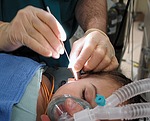Can tinnitus go away?
Hearing unwanted ringing, buzzing, whistling, or hissing , is a major problem already.
Having your tinnitus getting louder is only that much worse.
To make persistent tinnitus go away, is often a matter of making changes in your life.
By definition, tinnitus is when the inner ear transmits signals to the brain that were not caused by an external source.
Unfortunately tinnitus is very common and occurs in about 1 out of 10 adults, usually afflicting those over 40 years old.
There are some simple things that you can do to help stop your tinnitus getting louder.
Before you start any tinnitus remedies, see your doctor to determine the underlying cause, if possible.
It could be caused by something as basic as a build up of wax in the ears.
Then again the irritating sounds could be an indicator of damage to the inner ear. or a host of underlying health issues.
Unfortunately, your tinnitus could also be idiopathic, i.e the result of no discernable cause.
If your doctor fails to find any medical reason for your tinnitus, you may be referred to an otolaryngologist (ear, nose, and throat specialist.
The specialist will examine your head, neck, and ears and test your hearing to determine whether you have any hearing loss along with the tinnitus.
You might be sent to an audiologist who can also measure your hearing and evaluate your tinnitus.
Are there tinnitus treatments that can help?
Tinnitus does not have a cure yet, but treatments that help many people cope better with the condition are available.
Most doctors will offer a combination of the treatments below, depending on the severity of your tinnitus and the areas of your life it affects the most.
Hearing aids often are helpful for people who have hearing loss along with tinnitus.
Using a hearing aid adjusted to carefully control outside sound levels may make it easier for you to hear.
The better you hear, the less you may notice your tinnitus.
Counseling helps you learn how to live with your tinnitus.
Most counseling programs have an educational component to help you understand what goes on in the brain to cause tinnitus.
Some counseling programs also will help you change the way you think about and react to your tinnitus.
You might learn some things to do on your own to make the noise less noticeable, to help you relax during the day, or to fall asleep at night.
Wearable sound generators are small electronic devices that fit in the ear and use a soft, pleasant sound to help mask the tinnitus.
Some people want the masking sound to totally cover up their tinnitus, but most prefer a masking level that is just a bit louder than their tinnitus.
The masking sound can be a soft “shhhhhhhhhhh,” random tones, or music.
Tabletop sound generators are used as an aid for relaxation or sleep.
Placed near your bed, you can program a generator to play pleasant sounds such as waves, waterfalls, rain, or the sounds of a summer night.
If your tinnitus is mild, this might be all you need to help you fall asleep.
Acoustic neural stimulation is a relatively new technique for people whose tinnitus is very loud or won’t go away.
It uses a palm-sized device and headphones to deliver a broadband acoustic signal embedded in music.
The treatment helps stimulate change in the neural circuits in the brain, which eventually desensitizes you to the tinnitus.
The device has been shown to be effective in reducing or eliminating tinnitus in a significant number of study volunteers.
Cochlear implants are sometimes used in people who have tinnitus along with severe hearing loss.
A cochlear implant bypasses the damaged portion of the inner ear and sends electrical signals that directly stimulate the auditory nerve.
The device brings in outside sounds that help mask tinnitus and stimulate change in the neural circuits.
Antidepressants and antianxiety drugs might be prescribed by your doctor to improve your mood and help you sleep.
Other medications may be available at drugstores and on the Internet as an alternative remedy for tinnitus, but none of these preparations has been proved effective in clinical trials.Can I do anything to prevent tinnitus or keep it from getting worse?
Noise-induced hearing loss, the result of damage to the sensory hair cells of the inner ear, is one of the most common causes of tinnitus.
Anything you can do to limit your exposure to loud noise – by moving away from the sound, turning down the volume, or wearing earplugs or earmuffs – will help prevent tinnitus or keep it from getting worse.
What are researchers doing to better understand tinnitus?
Along the path a hearing signal travels to get from the inner ear to the brain, there are many places where things can go wrong to cause tinnitus.
If scientists can understand what goes on in the brain to start tinnitus and cause it to persist, they can look for those places in the system where a therapeutic intervention could stop tinnitus in its tracks.
The National Institute on Deafness and Other Communication Disorders (NIDCD) sponsored a workshop that brought together tinnitus researchers to talk about the condition and develop fresh ideas for potential cures.
During the course of the workshop, participants discussed a number of promising research directions, including:
Electrical or magnetic stimulation of brain areas involved in hearing.
Implantable devices already exist to reduce the trembling of Parkinson’s disease and the anxieties of obsessive-compulsive disorder.
Similar devices could be developed to normalize the neural circuits involved in tinnitus.
Repetitive transcranial magnetic stimulation (rTMS). This technique, which uses a small device placed on the scalp to generate short magnetic pulses, is already being used to normalize electrical activity in the brains of people with epilepsy.
Preliminary trials of rTMS in humans, funded by the NIDCD, are helping researchers pinpoint the best places in the brain to stimulate in order to suppress tinnitus.
Researchers are also looking for ways to identify which people are most likely to respond well to stimulation devices.
Hyperactivity and deep brain stimulation. Researchers have observed hyperactivity in neural networks after exposing the ear to intense noise.
Understanding specifically where in the brain this hyperactivity begins and how it spreads to other areas could lead to treatments that use deep brain stimulation to calm the neural networks and reduce tinnitus.
Resetting the tonotopic map. Researchers are exploring how to take advantage of the tonotopic map, which organizes neurons in the auditory cortex according to the frequency of the sound to which they respond.
Previous research has shown a change in the organization of the tonotopic map after exposing the ear to intense noise.
By understanding how these changes happen, researchers could develop techniques to bring the map back to normal and relieve tinnitus.
Source: http://www.nidcd.nih.gov/health/hearing/pages/tinnitus.aspx
A tinnitus solution could be as simple a change in old habits.
Your persistent ear ringing might be down to something pretty basic, like an excessive intake of salt.
Letting yourself get dehydrated after too much alcohol can make your tinnitus worse.
Look at your general fitness level. Are you steadily gaining weight and neglecting to exercise?
Stress can be a big contributor to your ears buzzing, rather than a result of tinnitus.
Posture, particularly if it results in regular neck tension, could also play a part.
Lowering your blood pressure through exercise and nutritional eating could help.
Perhaps it’s time to make some adjustments to your lifestyle.
- Relax your stress and anxiety away. Stress and anxiety can play a major part in making your tinnitus louder.
- Listen to soothing music, follow relaxation exercises, yoga, meditation, or a hot bath.
- Unwanted stress can cause muscle tension, anxiety and irritability, making your tinnitus worse causing more stress. It’s a horrible cycle.
- Pay attention to the foods you eat and adjust your diet accordingly.
- For some people, alcohol and caffeine are causes for their tinnitus getting louder.
- Use a noise machine to get more sleep. At night, it’s hard to sleep when it’s quiet because the ringing may seem louder.
- Then the next day you’re more tired, which causes more anxiety and stress.
- Lack of sleep can cause depression, negative thoughts, and a result increased anxiety and tinnitus.
- Using a noise machine at night while sleeping can help make the ringing sound less isolated making it easier to sleep.
- There are a lot of things that cause tinnitus getting louder that your doctor can assist you with. Anything from a head or neck injury, sinus complications, middle or inner ear infection, tumor on the auditory nerve, or excessive wax build up, can make your tinnitus louder.
- Also, medication and large amounts of aspirin over a period of time can cause your tinnitus to get louder. Again, ask your doctor.
- Use ear protection. Excessive prolonged noise can cause tinnitus and hearing loss, and if you already have tinnitus, can make it louder.
- Use ear plugs or ear muffs to protect your ears.
- Use a hearing aid, or hearing aid with a masking capability.
- Hearing aids help to hear the normal sounds around you better so that the ringing doesn’t stand out and in this case help stop tinnitus getting louder.
- A hearing aid with masking emits a frequency that helps drown out the ringing.
I hope the information above has been helpful to manage your tinnitus.

